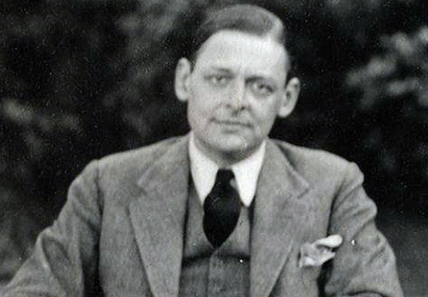Born into a Unitarian family, the poet T.S. Eliot entered the Church of England in 1927—although he preferred the designation “Anglo-Catholic.” The year before, Eliot had met with a particularly erudite Roman Catholic convert—the French philosopher Jacques Maritain—whose work “made a deep impression on me.” In a remembrance of Maritain, the American critic Wallace Fowlie recalls how Eliot, his professor at Harvard, enthusiastically recommended Maritain’s book Art et scolastique.
Eliot was not merely an intellectual influence; Fowlie remembers how, as a server at Anglican Mass, he would see Eliot there. “He was often the only one present, apart from the priest and myself.” One morning, Eliot received communion, and then returned to his seat in the nave of the chapel. Then “we heard a heavy thud, turned around, and were startled to see Mr. Eliot flat on his stomach, his arms outstretched.” Fowlie and the priest were confused; they finished the service, but Eliot remained face down on the floor. They then helped Eliot back to his seat. The poet was fine. Fowlie was certain, though, that Eliot had “a religious experience.”
Years later, Fowlie told Maritain the story of Eliot’s unusual moment in church, and the philosopher wept. He understood that ecstasy; that need to offer one’s self to God in certain moments.
The two-volume paperback release of Eliot’s poems is a good time to appreciate a poet who could stir the soul of a philosopher. The playful covers of these volumes elicit a certain quirkiness—something that is both a function of, and perhaps a reason for, Eliot’s Catholic religious sense. The commentaries and composition notes presented by the editors, Christopher Ricks and Jim McCue, are exemplary.
The first volume includes a corrected version of Eliot’s Collected Poems (1902-1962). The second includes his two children's verse books, his translation of Saint-John Perse's Anabase, as well as other occasional works. Eliot’s collected work is impressive, expansive, essential. Certainly having “The Love Song of J. Alfred Prufrock,” “The Waste Land,” and “Four Quartets” on hand is essential for any lover of poetry, but these volumes offer another benefit: a new look at well-read works.
“Ash Wednesday,” one of his most masterful pieces, was first composed 90 years ago, and yet remains absolutely haunting. Eliot had told the poet William Force Stead, who baptized him into the Church of England, that “between the usual subjects of poetry and ‘devotional’ verse there is a very important field still very unexplored by modern poets—the experience of man in search of God, and trying to explain to himself his intenser human feelings in terms of the divine goal.” “Ash Wednesday,” Eliot said, was his attempt.
The poem’s final lines are powerful:
Blessed sister, holy mother, spirit of the fountain, spirit of the garden,
Suffer us not to mock ourselves with falsehood
Teach us to care and not to care
Teach us to sit still
Even among these rocks,
Our peace in His will
And we among these rocks
Sister, mother
And spirit of the river, spirit of the sea,
Suffer me not to be separated
And let my cry come unto Thee.
Part ritual, part prayer, part search, “Ash Wednesday” is Eliot at his best. The poet W.H. Auden said that Eliot was a “conscientious church-warden,” but also had the soul of a “twelve-year-old boy,” a “practical joker who suddenly interrupts” his more stoic self. Old Possum’s Book of Practical Cats, included in the second volume, is a more playful Eliot—a pleasant contrast to his ambitious, haunting masterpieces.
We find all variations of Eliot in these collected volumes, and sufficient evidence that he practiced the literary criticism that he preached. In a 1930 letter, Eliot wondered: “Why should people treat verse as if it were a conundrum with an answer? When you find the answer to a conundrum it is no longer interesting. ‘Understanding’ poetry seems to me largely to consist of coming to see that it is not necessary to ‘understand.’” His poems remain beautiful conundrums; ardent searches for God: “Where shall the word be found, where will the word / Resound?”
Nick Ripatrazone has written for Rolling Stone, Esquire, The Atlantic, and is a Contributing Editor for The Millions. He is writing a book on Catholic culture and literature in America for Fortress Press.
Start your day with Always Forward, our award-winning e-newsletter. Get this smart, handpicked selection of the day’s top news, analysis and opinion, delivered to your inbox. Sign up absolutely free today!

